A ballot initiative filed Aug. 2 with California’s Attorney General seeks to strengthen open records laws and provide public access to more legislative documents and records, as polling shows the proposal to be overwhelmingly popular.
Meanwhile, proponents are suggesting that public access and government accountability are long overdue.





